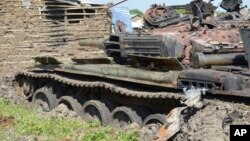On July 9th, the fifth anniversary of South Sudan’s independence passed without celebration. Instead, the capital city, Juba, was consumed with renewed fighting between rival factions, which escalated into violence reminiscent of the country’s civil war and raised fears for the country’s increasingly fragile peace.
In December 2013, a power struggle between President Salva Kiir and Vice President Riek Machar escalated into a civil war. Fighting reopened ethnic fault lines between Kiir's Dinka and Machar's Nuer ethnic groups. Some reports indicate up to 50,000 people have been killed and more than 2.2 million driven from their homes, with many fleeing to neighboring states.
Finally, last August, both Salva Kiir and Riek Machar signed a peace agreement to end the devastating conflict. The agreement confirmed Salva Kiir as President and Riek Machar returned to government as the First Vice President. The agreement provided for a transitional government of national unity.
In late April, Riek Machar arrived in Juba and was sworn in as First Vice President. It seemed South Sudan was finally turning a corner. The sudden eruption of violence in recent days, in addition to the tragedy of more lives lost and more people displaced, has cast a deep shadow over the prospects for lasting peace under the agreement. The United States and the rest of the world have called for all sides to abide by the ceasefire declared on July 11 and allow the security situation to stabilize.
United Nations Secretary-General Ban Ki-moon said, "Yet again, the leaders of South Sudan have failed their people. Rarely has a country's conduct squandered so much promise so quickly."
“The United Nations Security Council, the African Union, and regional partners have been actively engaged in calling on the leaders in South Sudan to commit to the full and immediate implementation of the peace agreement, including the permanent ceasefire,” said State Department Spokesperson John Kirby.
“[The United States] strongly urge[s] that the two leaders do everything in their power to ensure these decrees will be fully respected and unfettered humanitarian assistance will be provided to those affected by the violence.”














